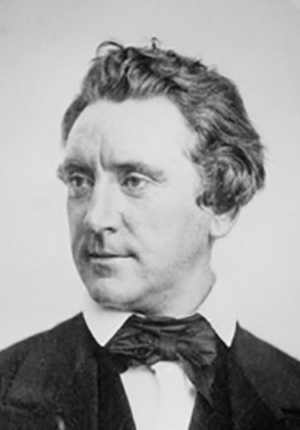Historic Document
Opinion of the Maryland Court of Appeals, Hughes v. Jackson, 12 Md. 450 (1858)
John Carroll LeGrand | 1858

Maryland State Archives
Summary
Chief Justice Roger Taney’s infamous decision in Dred Scott v. Sandford (1857), which declared that all people of African descent had neither citizenship nor rights, met with immediate opposition not just in the court of public opinion, but also in state and federal courts. State judges limited the reach of the decision, confining the implications to federal cases only, and federal judges limiting its restrictions even there. Those decisions underscore the more limited authority of the U.S. Supreme Court at this time to define constitutional issues, which were not seen as that Court’s exclusive purview. They also reveal the balance of power between the federal government and the states: federal law applied to federal cases; states controlled the rights of all residents within their borders when it came to state law and developed their own definitions of state citizenship based on those powers. Hughes v. Jackson, which came before the Maryland appellate court in 1858, involved Josiah Hughes and Samuel Jackson, two free black men, who were embroiled in a property dispute that ultimately resulted in Jackson seizing Hughes’s five children. The question was whether these men had standing to sue in the court at all, given the decision in Dred Scott. The court in Maryland, Taney’s home state, determined that they did, exposing the depth of divisions over questions of race and slavery at this time.
Selected by

Laura F. Edwards
Class of 1921 Bicentennial Professor in the History of American Law and Liberty, and Professor of History at Princeton University

Kurt Lash
E. Claiborne Robins Distinguished Professor of Law at the University of Richmond
Document Excerpt
The law of Maryland does not presume under all circumstances that a negro is a slave. In all cases where he is held and claimed as a slave, and in all petitions for freedom the courts have decided, that he is presumed to be a slave, and the onus . . . is upon him to make out his freedom . . . but the courts have never decided that in other cases all negroes should be regarded as slaves. The opinion, that all negroes held and claimed as slaves were such, was founded upon the acts of 1663, ch. 30, and 1715, ch. 44, declaring that all negro and other slaves, imported or to be imported, and their children should be slaves [during their lives], but those acts especially that of 1715, does not declare all negroes free at that time or before, nor their children slaves. . . . Negroes going at large and acting as free, are regarded as free men, and presumed to be such until claimed as the property of some one. Such was the opinion and common law of the State before the aforesaid acts of Assembly. In certain cases they voted, bore arms, gave evidence in courts, and performed other acts now confined to the white man. They are now restrained from voting, bearing arms, and giving evidence, by statutes of 1717, ch. 13, 1846, ch. 27, 1783, ch. 23, 1796, ch. 67, sec. 5, but the presumptions are the same as before these acts. The various cases cited by the appellant, are not in conflict with this position. They were all cases where the parties were claimed as the property of some one.
Has a negro any status as a person or citizen, and can he sue in the courts of this State? If he be a slave he can only sue for his freedom: he has no other right to appear in court: he can have no property to defend or wrong to redress. If he be free he is still not a citizen nor is he an alien. He occupies an anomalous position, having more rights than a stranger, yet not the same as an heir. He can sue and be sued in our courts, hold property and enjoy the fullest protection of our laws. In the Dred Scott case, the Supreme Court did not decide that a negro from his color was presumed to be a slave, but that no one who was of African descent could be a citizen of the United States, and sue in the United States’ courts. He might still be a citizen of a State, and as such a free man, but still not entitled to reap the benefits of citizenship of the United States. No point in that case conflicts with the position of the appellee.
From the earliest history of the colony, free negroes have been allowed to sue in our courts and to hold property, both real and personal, and at one time, they having the necessary qualifications, were permitted to exercise the elective franchise. To deny to them the right of suing and being sued, would be in point of fact to deprive them of the means of defending their possessions, and this, too, without subserving any good purpose to the rest of the community. Neither the policy of our law, nor the well-being of this part of our population, demands the principle of exclusion contended for by the appellant, on the contrary, they are both opposed to it, and so long as free negroes remain in our midst a wholesome system induces incentives to thrift and respectability, and none more effective could be suggested than the protection of their earnings. The words, free negro, are not essential in the averments of the pleadings except in the case of a petition for freedom; in all others the word “negro” is sufficiently full in its description; it notifies the adversary party of the fact of color, and thus affords him an opportunity to show the condition of slavery, if such be the case, by pleading that disability.




